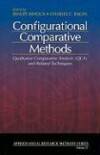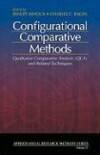
- Retrait gratuit dans votre magasin Club
- 7.000.000 titres dans notre catalogue
- Payer en toute sécurité
- Toujours un magasin près de chez vous
- Retrait gratuit dans votre magasin Club
- 7.000.0000 titres dans notre catalogue
- Payer en toute sécurité
- Toujours un magasin près de chez vous
Configurational Comparative Methods
Qualitative Comparative Analysis (Qca) and Related Techniques
Benoît Rihoux, Charles C RaginDescription
Configurational Comparative Methods paves the way for an innovative approach to empirical scientific work through a strategy that integrates key strengths of both qualitative (case-oriented) and quantitative (variable-oriented) approaches. This first-of-its-kind text is ideally suited for "small-N" or "intermediate-N" research situations, which both mainstream qualitative and quantitative methods find difficult to address. Benoît Rihoux and Charles C. Ragin, along with their contributing authors, offer both a basic, comparative research design overview and a technical and hands-on review of Crisp-Set QCA (csQCA), Multi-Value QCA (mvQCA), and Fuzzy-Set QCA (fsQCA).
Key Features
- Discusses existing applications in many different fields and disciplines along with state-of-the-art coverage of the strengths and limitations of these techniques
- Demonstrates further inventive ways of using QCA techniques
- Provides advice on how to develop a comparative research design (case and variable selection) as well as a specific technique called MSDO/MDSO (most similar, different outcome/most different, same outcome).
- Shows how to perform the technical operations linked to three specific QCA techniques: csQCA, mvQCA, and fsQCA
- Includes a glossary, an extensive bibliography, and a detailed list of good practices at every stage of the research process
Intended Audience
A must for any student or researcher who wants to engage in systematic cross-case comparison in the social and behavioral sciences, the book is ideal for use in upper-level undergraduate and graduate-level social science research methods courses.
Spécifications
Parties prenantes
- Auteur(s) :
- Editeur:
Contenu
- Nombre de pages :
- 240
- Langue:
- Anglais
- Collection :
- Tome:
- n° 51
Caractéristiques
- EAN:
- 9781412942355
- Date de parution :
- 14-08-08
- Format:
- Livre broché
- Format numérique:
- Trade paperback (VS)
- Dimensions :
- 137 mm x 213 mm
- Poids :
- 249 g

Les avis
Nous publions uniquement les avis qui respectent les conditions requises. Consultez nos conditions pour les avis.






